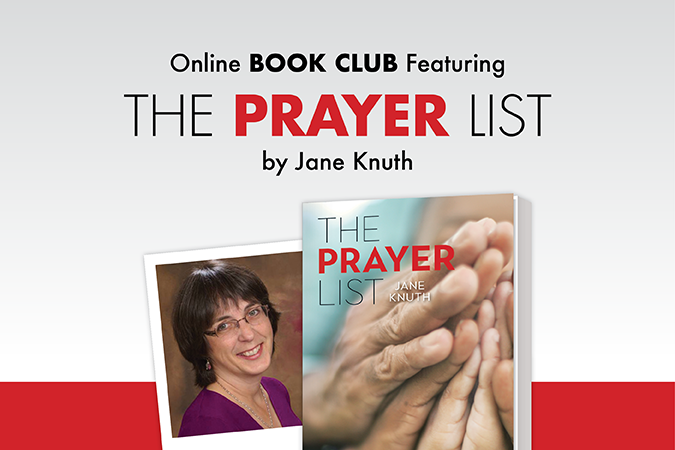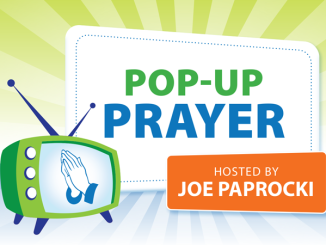Our online book club starts on Monday! As we get ready to read together The Prayer List by Jane Knuth, I asked Jane to share more about prayer and the book with us.
Joe Paprocki: When you inherited your family prayer list, your first reaction was, “Uh-oh.” Tell us more about that reaction.
Jane Knuth: Frankly, it looked like a lot of work to me. Aunt Kay spent hours each day praying for people, and I didn’t want to invest that much time in it. I was busy! I didn’t have time to pray like she did. Did I have a lot to learn!
JP: You say in the book that, “Family prayer is a simple thing that is hard to do.” Can you explain what you mean by this?
JK: Praying by myself is a matter of prioritizing what is most important in my schedule—simple. Praying as a family involves other people who may or may not be convinced of the necessity of regular prayer. Dean and I didn’t begin our marriage by praying together every day. It was something that evolved through the influence of church, our children, and some spiritual experiences. Even today, with all those factors pointing us to prayer, one of us still has to take the risk to say each day, “Can we pray now?”
JP: What do people in general “not get” about prayer? In other words, what are common misconceptions people have about prayer?
JK: Prayer is not something we do. Prayer is a relationship with God. So, in that sense, it isn’t something we can get done each day and call it good. Like any relationship, we need to pay attention.
JP: What is the benefit of keeping a prayer list?
JK: It saves me from that embarrassing moment when I meet someone whom I promised I would pray for, but I forgot. The prayer list helps me remember whom to pray for.
JP: What do you recommend for people when they feel that a prayer was not answered as they had hoped?
JK: That’s the big problem, isn’t it? Prayer isn’t magic. We don’t get everything we pray for. I go after that problem in chapter one: “God Doesn’t Give Bicycles.” The Prayer List is not a book about how to get all your wishes to come true. Many of the stories tell about outcomes that are not ideal in the pray-er’s eyes. Near the end of the book, in chapter 28, we see the answers go either way all through Tom’s life. He receives many answers, and he doesn’t like some of them. But, oh my, Tom prays boldly, and some of the answers he receives are spectacular! What would I recommend? Don’t ever stop praying.
JP: You say in the book that, “Prayer should lift us up out of the mire of worry.” Can you say more about that?
JK: Worry and prayer are not the same thing. They are opposites. Worry is a mire, a tangle, and an endless loop. When I think of prayer, I think about St. Joseph. He seems to get the answers to his prayers and problems while he is asleep. Obviously, he was not up all night worrying. He had plenty of problems, but he slept just fine.
JP: How do you prevent praying with a prayer list from becoming a monologue, as though it is like sitting on Santa’s lap, asking for what we want? How does God enter the dialogue?
JK: A monologue is not a relationship. Our part of a relationship with God goes like this: we pray; God listens; God answers our prayer; sometimes we don’t like the answer; and we keep praying. God wants the relationship more than anything else we can give. So, say what you mean. Ask for what you really want. Be honest.
In a real relationship, the other person has wants and needs, too. We can ask God what God wants. Perhaps the Almighty knows something about a situation that we aren’t aware of. In any relationship, it’s not good if one person does all the demanding and asking. God wants to help us see another point of view than our own. That’s real. I ask God about how God sees the situation, and then I make time to sit still and be quiet. I stop talking so God can talk.
JP: In the epilogue, you use the phrase, “And I knew it was okay,” as the realization that many people come to after praying about difficult situations. What does this phrase mean?
JK: “Okay” is not church language. It is not something they were repeating from theology classes, sermons, or Bible studies. Yet, so many of the people who told me their stories ended them by saying, “And I knew it was okay.” I think it’s important to pay attention to the common words and actions of ordinary people. It does not mean that their prayers were answered exactly as they wished. If that were the case, they would have said, “And it was perfect!” When people told me, “I knew it was okay,” they were describing, not the situation, but their hearts. They felt a measure of peace in an unexpected, unwelcome outcome. Where would that peace come from except from prayer?
JP: Finally, Jane, if you were passing along your family prayer list to someone else, what is the one most important piece of advice you would offer?
JK: Don’t ever stop praying.
JP: Thanks so much for sharing!
JK: Thank you, Joe! I enjoyed your questions. Peace and okay-ness to you!
Learn more about the book club, and introduce yourself to other readers here. #prayerlist





Be the first to comment